Impressive Technological Gains Showcased at Interwood 2008
2008/11/14 | By Ken LiuComputerization, high-speed and high-precision technologies took center stage at the Taipei International Woodworking Machinery and Supplies Show 2008, or Interwood 2008, which was held from July 4 through 7.
At the opening ceremony, Fred Huang, chairman of Taiwan Association of Machinery Industry, noted the impressive technological gains made by Taiwanese woodworking equipment makers. Domestic producers, he said, have introduced machines with a processing deviation of only plus and minus 0.01mm, a precision level previously seen in the metal processing segment.
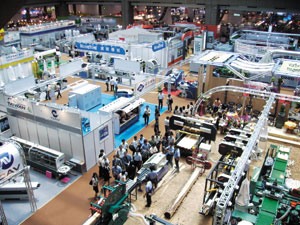
The triennially held Interwood show, now in its 10th anniversary this year, drew 182 exhibitors, 1,070 booths and 4,868 visitors, including over 800 foreign buyers. The visitor number was up 26% from last show. This year, buyers from emerging economies including Guatemala, El Salvador, Ukraine, Bulgaria, Thailand and Malaysia far outnumbered those from developed economies, showing the appeal of low-cost, high-performance Taiwan-made woodworking machines in these emerging economies.
Although the woodworking machinery industry has been affected by the global economic downturn, Taiwanese manufacturers in the segment have consolidated their market position by developing high-end machines and diversifying market exposure, according to Bill Hung, chairman of the Taiwan Woodworking Machinery Association.
Winning Designs
This year, the show organizers-Taiwan External Trade Development Council (TIATRA), Taiwan Woodworking Machinery Association and Taiwan Association of Machinery Industry-arranged an award activity to highlight innovative design in Taiwan's woodworking-equipment industry.
Boarke Machine Co., Ltd. earned an award for its moving-bridge type CNC machining center. This machine comes with one spindle and one tool magazine coupled with seven vertical and two horizontal lines of boring heads. Its drum type automatic tool change system can change a cutter from the eight-tool magazine in just eight seconds.
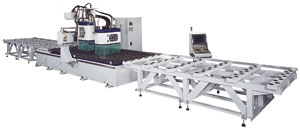
The machine can cut boards without pre-sawing them into smaller pieces, eliminating the need to install molds for sawing. This machining center can handle complex woodworking pieces and a wide array of small volume pieces, such as cabinet doors, solid-wood doors, computer desks and panel-type furniture. It can also process plastic and soft-metal workpieces.
"This is the first time we have exhibited this machine," said Bill Hung, Boarke's chairman. "The machine's high processing precision eliminates the need for secondary processing," he adds. Windows-based computerized controls help reduce the machine's processing error to just plus or minus 0.00002mm. Hung notes that such high precision level is crucial when processing knock-down pieces, since each wood part needs to perfectly fit each other.
The machine's spindle moves on five axes, with one axis horizontally turning 360 degree and one vertically turning 360 degree.
Security and user friendliness are the major drawing points of this machine. Infrared sensors are equipped around the working table of this machine, notifying computer to shut down machine when detecting people entering the working area. The control computer can also send and receive email so operators can handle such tasks without leaving the machine.
High Precision
Leadermac Machinery Co., Ltd. won two awards at the show-its LMC 1023T four-side molder and a smart tool change system for CNC machines. The molder is a numerically controlled machine equipped with four to 10 spindles in diameter of 1 13/16 inch, 50mm and 2 1/8 inch. They turn at speeds of 6,000, 7,200 and 8,000 rounds per minute.
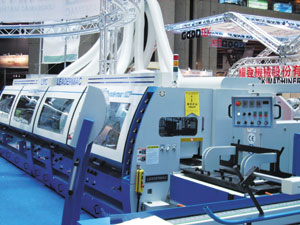
The machine boasts average processing efficiency of 150 meters per minute, reportedly about four times faster than standard models in this category. "This level of output efficiency is only achieved by Leadermac's molders and German molders," claims Michael Chang, the company's chief executive officer. The machine also has a processing error of only plus or minus 0.02mm. "The rising demand for DIY-furniture has forced furniture manufacturers to increase processing precision," he said.
The machine is controlled by Windows-based PLC program and comes with operating manuals in seven languages. Leadermac exports the machine mainly to Europe and the United States, where labor costs are expensive. The model is well suited for making wood furniture, wood flooring, kitchen furniture, and building materials.
The company's efficient tool change system boasts tool calibration time of only five minutes, compared with reported 30 minutes in systems supplied by other manufacturers. The system can be linked to six machines at one time as its maximum control load. "We develop the system in cooperation with dedicated software and hardware companies," Chang says.
Cut Above the Rest
Kuang Yung Machinery Co., Ltd. was awarded for its CFS-200A semi-optimizing cut-off saw at the show. This machine is designed for prep-cutting materials for finger-jointer production and mass productions of other woodworking parts.
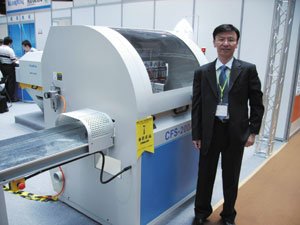
The CFS-200A has a listed maximum feed speed of 150 meters per minute and maximum cutting rate of 180 cuts per minute. Its maximum cutting size is 75mm (height) x 135mm (width) or 38mm (height) x 200mm (width). It has four cutting modes-fixed length mode, sequential mode, marking line mode, and mixed mode.
The CNC machine is equipped with a user-friendly operating interface. Affordable mid-range pricing is another attraction of this model, Chang says.
Eco-friendly
Big Toyo Machinery Co., Ltd. exhibited its eco-friendly and cost-efficient HAC1500 automatic cleaning painting machine for pallets. This machine is equipped with a recycling device to reclaim lacquer for reuse. The machine applies a thicker coat of paint to the side edges of workpieces by enabling sprayed lacquer to splash from the transmission belt onto the edges.
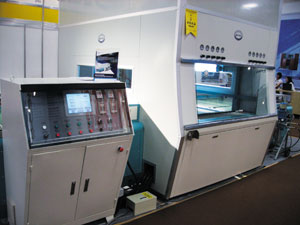
According to company chairman Roger Fan, this machine processes workpiece at a rate of one to six meters per minute depending on the speed setting. "The machine can process pieces of any length, a maximum width is 1.5 meters and a maximum thickness is 50mm," he adds. This machine is controlled by a PLC program with touch-screen panel.
"We developed this machine based on ecological and cost concerns," Fan stresses. Fan claims that the machine can pare material costs by 25%, thanks mainly to its recycling function. Big Toyo has shipped 10 of the machines since their debut last year, mostly to wood-panel manufacturers.
The machine can be used for solvent paint and water-based paint spraying. Efficient reciprocator allows workpieces to be sprayed evenly.
Safety First
Co-Matic Machinery Co., Ltd. demonstrated its patented AF114 jointer feeder at Interwood this year. Safety and efficiency are two of the highlights of the award-wining machine.
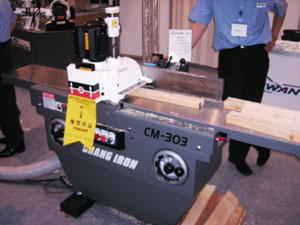
The machine can handle continuous and multiple feed operations. It is also equipped with a safety cover to separate users from the cutters. "This machine is light, small, and economical," the sales representative stressed.
According to the sales representative, Co-Matic is the biggest and most diverse supplier of woodworking feeders.
One-stop Shop
For many international buyers, one of the biggest appeals of Interwood is the convenience of one-stop shopping.
Frema Trade AG of Switzerland imports woodworking machinery exclusively from Taiwan. The company's chief executive and president, Rene M. Frei, stressed that Taiwan-made machines come close to Japanese counterparts in terms of technical quality. However, Taiwanese machines account for only about 1.5% of the European market, he estimated. "The reason is that Europeans usually confuse the Republic of China [Taiwan's official name] with China, leading them to buy more machines from China than Taiwan. In addition, the Chinese government and Japanese government have more aggressively marketing their machinery in Europe, while the Taiwanese government has done nothing. That's a problem for Taiwan's woodworking-equipment manufacturers," he adds.
Frei began importing machines from Taiwan 10 years ago and has been increasing purchases over the past four years. "We are very happy to do business with Taiwanese equipment suppliers. The problem now is high material costs triggered by surging oil prices," he says.
He points out that the European woodworking market is quite "confused" now because the strong euro has made European exports expensive relative to U.S. exports. "But local woodworking markets in European countries have spiked due to the increasing construction of wood houses as consumers seek to reduce CO2 emission," Frei noted.
Frei said that European equipment buyers do not necessarily buy cheap products, suggesting that Taiwanese equipment suppliers do not need to move to China and compete on price alone. "European buyers are looking for a good price relative to quality," he stressed.
Big in Vietnam
Cao Duy Tam, director of Vetta Co., Ltd., a Vietnamese importer of woodworking machines, said he has visited every Interwood show and plans to attend the next one in three years. Tam noted that his company buys machines mostly from Taiwan due to their good quality and reasonable prices. "Vietnamese furniture makers may buy some very special machines from Europe, but 90% of their machines come from Taiwan," he said.
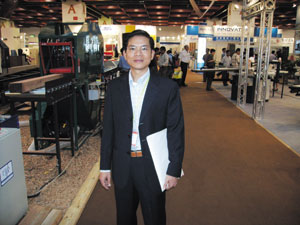
Tam's company imports semi-automatic or manually controlled machines. He said fully automatic machines are rare in Vietnam due to their high cost and need for highly trained operators. "If you buy automatic machines, no one knows how to operate them." Tam says that Vietnamese buyers also prefer semi-automatic machines, but that could change soon as producers seek to boost quality.
Furniture is now Vietnam's sixth-largest export industry, behind only crude oil, garment and textiles, footwear, seafood and rice. The Vietnam Woodwork and Forestry Products Association forecasts that woodwork exports from Vietnam will grow by between 4% and 10% up to 2010.
Tam believes that the biggest problem facing furniture manufacturers in Vietnam today is inflation. "The government has failed to control prices, so the inflation rate tops 20%. Many factories are worried," he said. "The good news is that the government has recognized the problem and is trying to ease the problem."
Inflation has hit Tam's business as well. "If furniture factories are in trouble, we are too," he stressed. But Tam strongly believes the problem is temporary and that the furniture industry will rebound. "I believe our government will be able to get inflation under control and slow GDP growth to 7 to 9%," he says.
Tam said that Vietnamese furniture exports reached US$2.4 billion in 2007 and are anticipated to gain by 20% in 2008.
Automating in UAE
Issam Alaskari, managing director of the Abu Dhabi-based importer PaintEx, said his company buys most of its machines from Taiwan and some from Europe. He notes that Taiwan-made machines nearly match European models in quality, yet come with lower price tags.
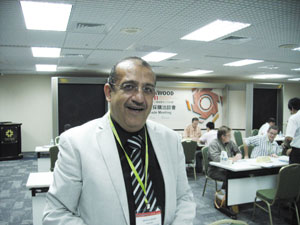
Alaskari pointed out that in spite of global economic recession, the UAE economy remains strong thanks to an influx of petrodollars. He believes that the woodworking market in his country has grown maybe five times bigger since 2005, when he first visited Interwood. "The show has more companies and more new products this year compared to the 2005 event," he said.
Innovative Appeal
Burcin Erdogan, mechanical engineer and member of executive board of the Istanbul-based importer N. Baylor Makine Tic. Ve San. A.S., said his company imports 80% of its machines from Germany and Italy and around 15% from Taiwan. He notes that Taiwanese machine producers deliver high quality products with innovative designs.
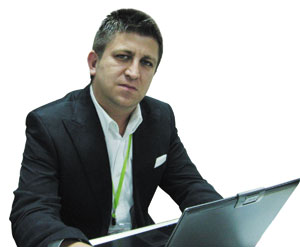
Erdogan said the Turkish market for machinery was "quiet" at the beginning of this year because of economic problems and internal political issues. "Over the past four years, the Turkish market was quite good. This year, the market has been affected by internal problems and global issues like soaring oil prices, the U.S. presidential election and Iraqi occupation. Iraq is our neighbor and we have customers there. So the war has hurt our business there," he noted.
At this year's Interwood, Erdogan was hunting for woodworking machines for furniture board and panel manufacturing. He noted that Turkey occupies an important position in connecting the Middle East and European markets.
Erdogan noted that labor costs in Turkey are now similar to Europe's. So, Turkish manufacturers are increasingly using automatic machines to reduce labor inputs. Automatic machines, he adds, also enable producers to boost quality.
Erdogan said that Turkey is a significant market for woodworking machines because Turkish furniture manufacturers export their products mostly to Europe, Russia, neighboring countries and the Untied States. The domestic furniture market is also lucrative, at about US$4 billion in retail revenue, Erdogan estimated.
Long-time Customer of Taiwan
Pieter Olivier, managing director of the Durban-based importer CMC Woodworking & Machinery Supplies (Pty) Ltd., has been importing woodworking machines from Taiwan since 1984. His company now imports 90% of its machinery from Taiwanese manufacturers like Leadermac (molding machines), C.K.M (finish joint lines), Kuang Yuan (high-speed cut-off saws) and Blue Steel (resaws). The company also imports Taiwanese machine tools. "In 1984 we found that Taiwan were bridging the quality gap with Europe in the machine market," he said.
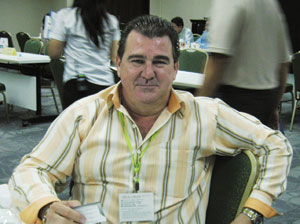
Although labor costs in South Africa remain fairly low, worker shortages are acute enough to make automated machines attractive to CMC Woodworking. Oliver estimated that the machinery market is his country is slowing with the global, yet turnover remains healthy at his company.
Oliver said that while there were fewer exhibitors at Interwood this year than in 2005, the quality of exhibitors at the show was better this time around. "When I say quality I mean more of the right people to see from a buyer's viewpoint," he explained.
Price Advantage
Fernando Pena, an El Salvador furniture manufacturer, attended Interwood this year to shop for automated machines to replace aging equipment. "Automated machinery from Taiwan is less expensive than U.S. and European models, yet comparable in quality," Pena said.
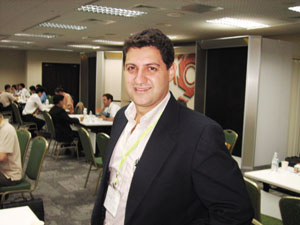
Imports Up
While Taiwan-made machines are gaining ground overseas, the island's demand for high-end machines from European countries like Germany is rising as well. According to HOMAG Taiwan's sales representative, Hugh Chen, HOMAG AG's Taiwan sales have increased around 50% in each of the past few years. "Consumer preference for high-quality, high-priced products increases when an economy grows to a certain level. That's why our sales in Taiwan have increased so significantly," he explained. He added that HOMAG has 30% of Taiwan market for woodworking machinery, with postforming machines being the major item.
The world's No.1 woodworking-equipment group opened its Taiwan branch four years ago after two decades of product promotion on the island. "People always think HOMAG machines are expensive when they compare the average NT$5 million [US$156,200] price tag on our machines with NT$2 million [US$62,500] on Taiwan-made equivalents. Actually, our machines are not expensive from a long-term perspective. A HOMAG machine has an operating life of at least 10 years, more than triple the lifetime of equivalent machines made in Taiwan," he noted.
Apart from their durability, HOMAG machines reduce production costs by eliminating the need for secondary processing on woodworking piece due to the high precision level of the first processing," Chen said.
Chen observed that the woodworking end-product market is also trending similar to the development of M-shape society, with consumers moving towards the bipolar upscale-downscale ends of the market. "This trend is pushing machinery buyers into the upmarket and downmarket areas," he noted.
HOMAG Taiwan has still felt the impact of the global economic meltdown and soaring commodity prices. According to Chen, many of HOMAG's customers have moved back procurement plans from the second half this year to wait out the down cycle.




